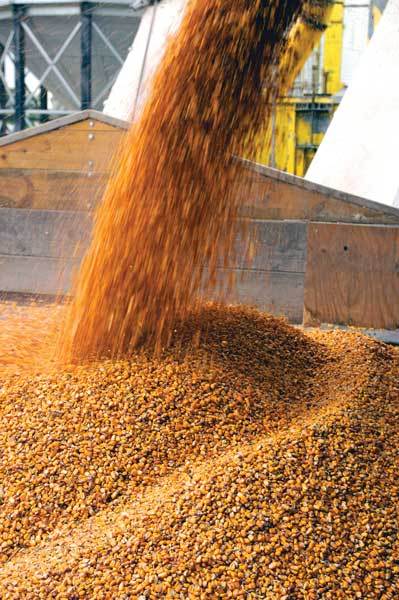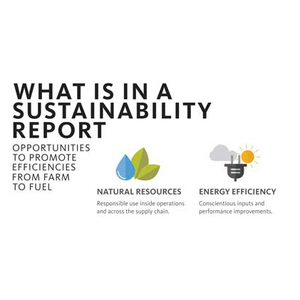Transparency, Credibility and Profitability



SOURCE: K·COE ISOM
June 26, 2018
BY K·Coe Isom
Despite the energy required to produce ethanol, the industry has significantly improved its energy balance and continues to make impressive strides. These improvements have existed within the ethanol industry mostly to navigate regulatory issues and market signals. The resulting efficiencies are generally accomplished without scrutiny from consumers and stakeholders.
The U.S. has no requirements for sustainability data or verified certification. International standards are in place, however, that require data and source certificates to export fuel or distillers dried grains.
Many financial and sustainability experts say the process used by ethanol producers to monitor and measure efficiency is on the cusp of drastic change. Donna Funk, principal at K·Coe Isom, has observed an increase of financial benefits when companies utilize sustainability measures as a competitive advantage in the marketplace.
“As stakeholders and consumers become more engaged with product transparency and environmental stewardship, the need for tracking and disclosing sustainability performance is growing,” she says. “What we’ve witnessed is that adopting these measures bodes well for ethanol plants—both small and large. By identifying a more meaningful advantage through the utilization of sustainability metrics for branding, marketing and optimizing the byproducts within the farm-to-fuel system, the end result often parlays into additional value on the top and bottom lines of the business.”
To the Future
To borrow the words of Bob Dylan, the times they are a-changin’ for ag renewable-based fuels and the sustainability story byproducts can tell. From a financial standpoint, other ag sectors have largely benefitted from the correlation between the monitoring and management of production efficiencies and the impact to business margins.
The beef industry is especially noteworthy, as it has engaged across the industry to implement sustainability standards for its supply chain, creating additional value for products.
According to the North American Meat Institute, transparency and producer stories are creating loyal customers. The dramatic financial impact the beef industry has experienced is a result of greater distribution, better relationships with customers and additional suppliers, prompted by incentivized improvements.
This comes as no surprise to Emily Johannes, director of ResourceMax sustainability services at K·Coe Isom. “The correlation of efficiency data and financial impact is tangible,” she says. “As consumers and stakeholders desire verified information from products, byproducts and the production process, sales gains are captured. Ethanol producers have a unique opportunity here because they provide a substantial feed source to an industry where sustainability really is emerging. The ethanol plants that validate, demonstrate and communicate their efficiencies by utilizing sustainability verification could easily see benefits far and above that of traditional measures.”
Sustainability and Credibility
Following the launch of its sustainable living program, consumer goods company Unilever reported 130 percent growth in its brand. This correlation was no coincidence. While performing sustainability audits can deliver reliable, verified process information to enhance the credibility surrounding products, it’s how the data is managed and improvements are demonstrated that provide growth opportunities.
For example, as a necessity for creating a product—fuel, DDGS or other byproducts—ethanol plants already measure total water usage and total energy usage to monitor significant cost to the business, as well as input to running the plant. Performing a third-party sustainability audit would demonstrate how that key performance indicator (KPI) of energy or water use per pound, gallon or liter of product is tracking over time, how the record keeping is being maintained to ensure that the number is accurate and valid, and where it is stored and managed.
This simple addition provides extra assurance around a metric that is already being tracked in the business. Perhaps more important, it provides a credible source of information outside the plant itself, showing the plant is following sustainability protocol under the guidance of experts.
“In the near future, it will no longer be about the immediate relationships within your sphere that are critical to your business,” Johannes says. “Capturing where your fuel is ultimately going, where DDGS end up, who your partners are, and recognizing their performance standards—these factors have all begun to garner attention from stakeholders that are looking at this industry. Beef has done a tremendous job marketing data transparency with effective results. They use quantitative and qualitative metrics within to explain where all their resources come from, how it runs within the system and what they’re doing.”
Economic Boost Through Perception
A single bushel of corn is often used in as many as 50 products. From that viewpoint alone, ethanol plants could better manage negative public perceptions by tracking and providing data that show the use of a product for many purposes and in many markets. Value is added through consumer engagement, and enhancing brand leverages a commodity into a better position.
Using sustainability measures, producers can also share the environmental impact from farm to product, and the story of all byproducts that ethanol plants produce.
For example, if DDGS are exported to the livestock market overseas, having the ability to track what the livestock is being used for down the value chain (e.g., Cargill, Tyson, Perdue, etc.) means sustainability can be verified and leveraged to promote the brand. This data verification and positioning can increase profitability and value in the marketplace.
Sustainability is a meaningful way to create opportunities that increase profit, reduce costs and manage risks—all adding to the bottom line.
“Through credible source verification and performance audits, ethanol producers can demonstrate a sustainable business model that exudes resource efficiency and the management of natural resources,” Funk says. “Those who are able to manage what they’re doing well, make improvements and invest in top line have the potential for higher profitability.”
Contact: Donna Funk
Principal, K·Coe Isom
913.643.5000
donna.funk@kcoe.com
---------------------------------------------------------------------------------------------------------------
CONTRIBUTION: The claims and statements made in this article belong exclusively to the author(s) and do not necessarily reflect the views of Ethanol Producer Magazine or its advertisers. All questions pertaining to this article should be directed to the author(s).
Advertisement
Advertisement
Related Stories
U.S. fuel ethanol capacity fell slightly in April, while biodiesel and renewable diesel capacity held steady, according to data released by the U.S. EIA on June 30. Feedstock consumption was down when compared to the previous month.
XCF Global Inc. on July 8 provided a production update on its flagship New Rise Reno facility, underscoring that the plant has successfully produced SAF, renewable diesel, and renewable naphtha during its initial ramp-up.
The USDA’s Risk Management Agency is implementing multiple changes to the Camelina pilot insurance program for the 2026 and succeeding crop years. The changes will expand coverage options and provide greater flexibility for producers.
EcoCeres Inc. has signed a multi-year agreement to supply British Airways with sustainable aviation fuel (SAF). The fuel will be produced from 100% waste-based biomass feedstock, such as used cooking oil (UCO).
SAF Magazine and the Commercial Aviation Alternative Fuels Initiative announced the preliminary agenda for the North American SAF Conference and Expo, being held Sept. 22-24 at the Minneapolis Convention Center in Minneapolis, Minnesota.
Upcoming Events










